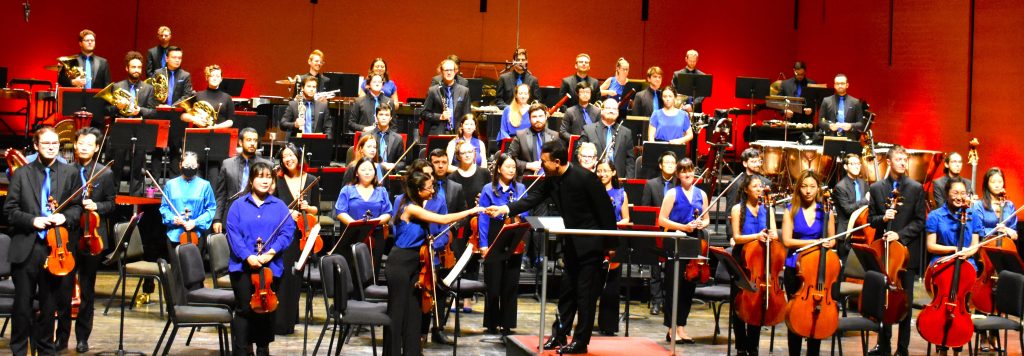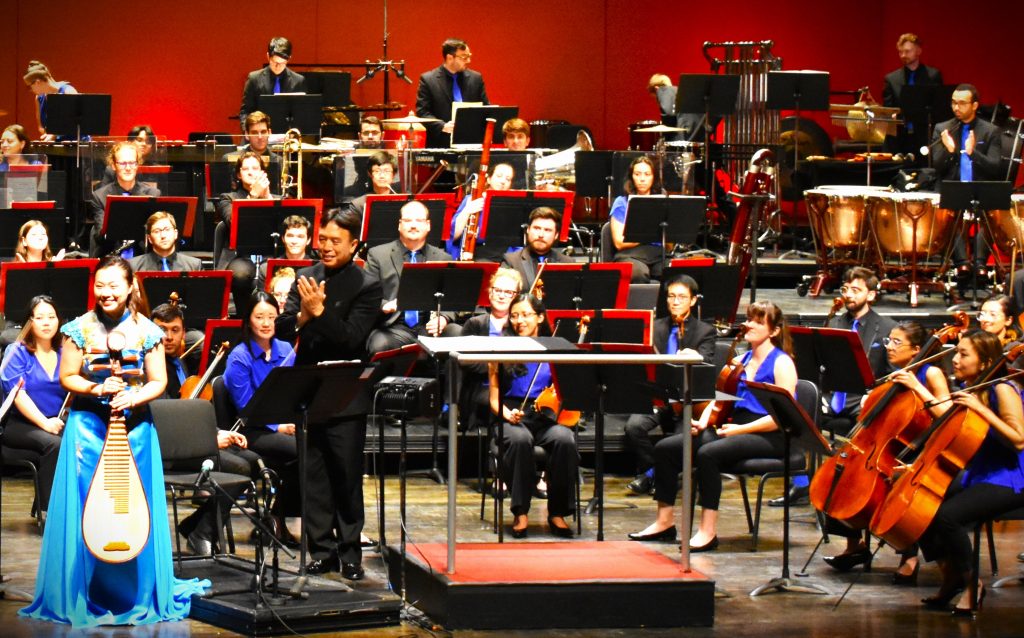
by Kevin T McEneaney
The air was filled with magic at Sosnoff Theater at Bard College: this was the culmination of the one-week long China Now Music Festival. Some fireworks splatter in the sky outside for those leaving the event, yet I am sure that for those who attended this concert fireworks would blaze through their ears and brain, well into the night and their dreams!
The Program was titled The Orchestra Now (TŌN) Celebrates the Music of Chen Yi and Zhou Long with the subtitle Generational Crossings. The first generation was represented by And the Fallen Petals by Chou Wen-Chung (1923-2019) after an eighth century poems by Meng Hao-jan. This impressive work blended traditional Chinese music with eloquent avant-garde, Dada-like surrealism. Fragments of music appeared and vanished as if they came from a magic lantern. One questioned what time period one was living in. The use of dramatic fragments indicated the influence of Claude Debussy and perhaps Ravel, yet it soared with a science fiction ambiance beyond the twentieth century. One was unmoored by dissonance while enchanted by rural folkloric themes as conducted with energy by Jindong Cai.

The third (current) generation showcased The Tale of the Southern Tour by Li Shaosheng (b.1988) which was written as part of his recent doctoral dissertation. After studying at Juilliard and the University of Missouri with Chen Yi and Zhou Long, he has written symphonies, chamber works, and the opera Marco Polo. The evocation of rural meanderings see-sawed with dissonant urban memories. There was an adroit, balanced dialectic at work in this work conducted by Chen Bing. The influence of Chen Yi, who has composed over a hundred works, weighed lightly on this work as he walked through the countryside.
Chen Bing then conducted Chen Yi’s magisterial Symphony No. 3, My Musical Journey to America (second generation) which consisted of three movements: The Dragon Culture, a depiction of traditional, rural Chinese culture with recollections of childhood. The Melting Pot depicted her immersion in American culture with an unusual blend of Chinese sounds from traditional European instruments in European symphonic structure. There was a passage that offered a hip-hop motif as part of the American musical landscape. The orchestration was a marvel of excited conversation about this melting pot where anything and everything appeared possible. The dramatic interplay of changing rhythms kept me on the edge of my seat. While the first movement had employed the pentatonic scale, the crescendo admitted the pentatonic motif to return and participate in the sumptuous finale. Although the audience was small, it applauded with wild enthusiasm.

I thought we had peaked out but much more was to come. Half the Reason Is You by Zhou Jan (b. 1981, current generation) featured Liu Xiaojing on pipa. This was structured like a piano or violin concerto with the pipa asserting and fighting for her own feminist reality against the orchestra, what the Greeks called a dramatic agon. All the Western instruments, including the harp, sounded as if they were all Chinese instruments. Western drums sounded Chinese, but the limited use of Chinese gongs appeared under the swift conduction by Jindong Cai. Liu Xiaojing was outstanding with picking and strumming and she appeared to finally win her independence from the orchestra.
A few years ago I had heard the premiers of a symphony by Zhou Long at Carnegie Hall which was an epic about Chinese workers building the American Trans-continental railroad and I admired the work, but I was not prepared for his latest masterpiece, Beijing Rhyme, premiered in Beijing this tear on June 25th. This work in for movements was inspired by his childhood in Beijing. Wind of Bell and Drum features fantastic percussion which recalls his early memories of growing up in the neighborhood of the bell and drum towers, enlivened with the humor of pigeons whistling in aerial ambiance. The drums were astonishing! Wind of Temple Festival recalls the local fairs he experienced, which features a constant change of rhythms as if a boy was flitting from booth to booth in a whirlwind tour of the fair where the pleasure of gongs excites him. Wind of Beijing Rhyme describes different styles of ballad singing in Beijing with expert employment of timpani. The last movement Wind of Hasty Beats features the violin chorus to describe folk-lore theater pageants, which rise to a sensational percussion crescendo and surges to the raucous finale which nearly took the roof off the building. I was thunder-struck and still am as I write this. The audience long applauded and demanded another bow.

By the way, Chen Yi and Zhou Long were both born in 1953. Chen Yi began playing violin at age four and Zhou Long began playing piano at age five. They are husband and wife, teaching at the same college in Kansas City.
If you missed this week’s celebration of Chinese Music in America, you are missing one of the most vibrant strands of world classical music in the 21st century.